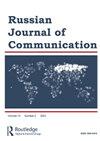Introduction: universality and specificity of emotions, with a focus on Russian
Q1 Social Sciences
引用次数: 0
Abstract
ABSTRACT An inseparable part of human life, emotions were neglected in the academic discourse in the West for a long time, because scholars juxtaposed them with thought and reason. Yet educational research reveals that emotions are manifestations of high order intelligence and stimulate goal achievement, memory, and motivation in knowledge acquisition. Emotions are culturally and individually shaped. While some cultures consider open demonstration of feelings inappropriate, others perceive unwillingness to reveal emotions as indicators of indifference. These differences are of major importance for understanding contemporary multilingual and multicultural societies. Differences in emotion management between majority and minority cultures may lead to intergroup conflicts. The interrelation between emotions, language and culture emerges in comparative analyses of emotion lexis in different languages. Although all languages contain words expressing positive and negative emotions, idioms, tropes and interjections used to render them vary. There is growing evidence that multilinguals often switch between languages to express their emotions more precisely, adjusting to the communicative situation. Moreover, foreign-language learners often misjudge their interlocutors' attitudes due to the insufficient knowledge of the norms of expressing emotions in the target language. They sometimes fail to predict the consequences of their own utterances, which may cause a communication break-down.导论:情感的普遍性和特殊性,重点是俄语
情感是人类生活不可分割的一部分,在西方学术话语中长期被忽视,因为学者们将情感与思想和理性并列。然而,教育研究表明,情绪是高阶智力的表现,并刺激目标实现、记忆和知识获取的动机。情感是由文化和个人塑造的。有些文化认为公开表达感情是不合适的,而另一些文化则认为不愿意表露情感是冷漠的表现。这些差异对于理解当代多语言和多元文化社会具有重要意义。多数文化和少数文化之间的情绪管理差异可能导致群体间冲突。通过对不同语言中情感词汇的比较分析,可以看出情感与语言、文化之间的相互关系。虽然所有的语言都包含表达积极和消极情绪的单词,但用于表达这些情绪的习语、比喻和感叹词各不相同。越来越多的证据表明,多语者经常在语言之间转换,以更准确地表达自己的情绪,以适应交际环境。此外,由于对目的语表达情感的规范了解不足,外语学习者往往会对对话者的态度产生误判。他们有时无法预测自己话语的后果,这可能会导致沟通中断。
本文章由计算机程序翻译,如有差异,请以英文原文为准。
求助全文
约1分钟内获得全文
求助全文
来源期刊

Russian Journal of Communication
Social Sciences-Political Science and International Relations
自引率
0.00%
发文量
0
期刊介绍:
Russian Journal of Communication (RJC) is an international peer-reviewed academic publication devoted to studies of communication in, with, and about Russia and Russian-speaking communities around the world. RJC welcomes both humanistic and social scientific scholarly approaches to communication, which is broadly construed to include mediated information as well as face-to-face interactions. RJC seeks papers and book reviews on topics including philosophy of communication, traditional and new media, film, literature, rhetoric, journalism, information-communication technologies, cultural practices, organizational and group dynamics, interpersonal communication, communication in instructional contexts, advertising, public relations, political campaigns, legal proceedings, environmental and health matters, and communication policy.
 求助内容:
求助内容: 应助结果提醒方式:
应助结果提醒方式:


